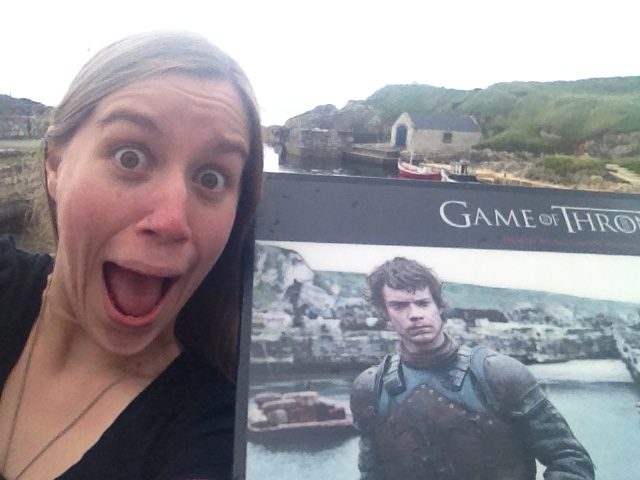So, I spent the last 5 months on remote organic farms with little to no WiFi. While going nearly cold turkey on Twitter, Facebook, Tumblr, E-mail and, of course, Watchers on the Wall was certainly interesting, what I found more noteworthy was living with people accustomed to life with limited WiFi … because they were completely unfamiliar with (and uninterested in) fandom.
Now, a wiser woman might have tried to downplay the extremity of her fangirl enthusiasm for A Song of Ice and Fire (ASOIAF) and Game of Thrones (GoT), but …
… subtlety’s never been my strength.
While explaining that I chose Rathlin Island as my first stopping point because of its proximity to Ballintoy Harbour or that the crab on my necklace pendant is actually a Greyjoy sigil, I realized that the people I was speaking with were looking at me like I was a character from The Big Bang Theory come to life. Their reactions ranged from politely perplexed to disdainful but their comments were all variations of the same question: “You’re a [seemingly] functioning grown woman who’s obsessed with a made up universe … why …?”
These conversations challenged me to articulate why I care so deeply about ASOIAF and GoT and got me thinking critically about the nature of fandom. Though I realize I’m preaching to the high Valyrian choir here on Watchers on the Wall, with the holidays and family reunions impending, I still think it’s worthwhile to work through some responses to Muggles’ most common comments about the ASOIAF/GoT fandom.
“It’s weird”
I mean … okay. Weirdness is a subjective term but I’ll concede that there is something counterintuitive about investing emotionally in a world that doesn’t exist that’s populated by people who aren’t real.
But here’s the thing: most events that people get excited about are counterintuitive – dare I even say weird – when you strip them of their cultural significance and look at them directly. The Super Bowl is just a football game, Thanksgiving is just a dinner and a wedding is just a ceremony built around two people entering into a legal/religious agreement. Yet, it’s not considered weird to invest time, money and effort into these things because it’s understood that they are more than the sum of their parts. People place importance on them and so they become important. The same is true of fandom. The distinction between what is socially acceptable and what is weird is really quite arbitrary.
“It’s just a TV show/book series”
Again, yes, it is … in the same way the Super Bowl is just a football game and Thanksgiving is just a dinner. Much of what I wrote in response to “It’s weird” is applicable here as well but I also feel it’s important to point out that fiction can have a very real impact on someone’s life.
I’ve written a fair amount about Theon Greyjoy’s personal significance to me and I know two domestic abuse survivors who find catharsis in writing Thramsay (Theon + Ramsay) fan fiction. The Reddit post, “A Dwarf’s Perspective on Tyrion Lannister” offers insight into the importance of Tyrion’s portrayal and I’ve met countless fans online who draw strength from Daenerys’ rise from human chattel to Khaleesi, Brienne’s rejection of traditional gender roles and Sansa’s resilience.
Of course, not every fan is drawn to ASOIAF/GoT for such intimate or serious reasons but in order to understand fandom it’s important to realize that, while ASOIAF and GoT are “just” works of fiction, they offer a lot of people much more than mere entertainment.
“Imagine the good you could do if you funneled that energy you spend on ASOIAF/GoT into actual real world problems?”
Ah, yes. The ever-popular false ultimatum to guilt fans for loving what they love. Let me scream this from the rafters: people are capable of juggling multiple interests at once. You can be an ASOIAF/GoT fan and an engaged citizen of the world. You can go to comic con and attend political rallies. You can be well versed in all the latest fan theories and read up on current affairs. Consternation for the fate or your favorite character does not cancel out concern for international conflicts.
These things are not mutually exclusive. It is known.
“Have you considered getting a life” (or some polite variation)?
Now, this one genuinely baffles me. If having a life entails venturing outside, having a social circle of peers with whom you share common interests and enjoying a hobby that utilize your talents and skills, well … that’s exactly what fandom offers. ASOIAF/GoT provides the framework for a community of podcasters, book club members, artists, fan fiction writers, cosplayers and *ahem* fan site contributors. It fosters discussions ranging from small talk to heated debates with friends, family and co-workers and facilitates conversations with new acquaintances.
It’s an excuse for friends and strangers alike to congregate and have a shared experience on Sunday night.
I almost don’t know how to respond to this comment when I get it because the answer is already in the question. The notion that having an emotional investment in the goings-on of Westeros and Essos entails sitting alone in a dark room in one’s underwear betrays a superficial understanding of the fandom.
“Okay, but why are so many people obsessed with ASOIAF/GoT specifically?”
That’s a fair question and one that I imagine everyone could answer differently. We all have our own origin stories as ASOIAF/GoT fans. Personally, I didn’t become one of the die-hards until I read the Reek chapters in A Dance With Dragons partly for the reasons hyperlinked above but also because I had never read anything written from the perspective of a brainwashed lackey before.
On one level, explaining the popularity of ASOIAF and GoT is simple: ASOIAF is a very well-written book series, GoT is a very well executed TV show and the masses have responded accordingly. However, on a more analytical level, I think ASOIAF/GoT owes its emergence, not merely as a success, but as a cultural phenomenon to the sheer scale of its story. The diversity of landscapes and its cast of thousands maximize readers’ and viewers’ chances of connecting to some aspect of this fantasy saga.
You’ve got blistering desert landscapes with dragons and snowy wastelands with ice zombies, complex political machinations and bare-boned struggles for survival. You have men and women clawing their way to the top and men and women falling from grace. There is something here for everyone.
Additionally, the social structure of Westeros lends itself to the creation of a tightly knit fandom. The fact that most of the characters belong to Houses facilitates the formation of sub-fandoms – communities within communities – with distinguishing iconography, colors, phrases and musical motifs that offer fans an intimacy born of specificity and distinctive tools with which to express their enthusiasm.
I don’t mean any of this cynically, by the way. I find such unmitigated joy in meeting other Greyjoy fans and waxing poetic about Theon and Yara/Asha with them. Relating to others within the context of a shared House aids that sense of community. ASOIAF/GoT means something to a lot of people and it can be incredibly gratifying to find others with whom you share opinions or experiences. If capitalizing on sigils and House words strengthens that sense of connection, then that’s something to embrace.
“I still don’t quite get it but you know what? You do you. Whatever floats your boat.”
Thank you. Cheers!
Is there some aspect of the ASOIAF or GoT fandom that I didn’t bring up or something you disagree with? Tell us below.
The post Is it ‘just’ a series? A guide to explaining the ASOIAF and Game of Thrones fandom to Muggles appeared first on Watchers on the Wall.
Via http://watchersonthewall.com


No comments:
Post a Comment